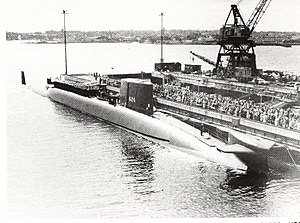USS Daniel Webster

| |
| History | |
|---|---|
| Name | Daniel Webster |
| Namesake | Daniel Webster (1782–1852), an American statesman |
| Ordered | 3 February 1961 |
| Builder | General Dynamics Electric Boat, Groton, Connecticut |
| Laid down | 28 December 1961 |
| Launched | 27 April 1963 |
| Sponsored by | Mrs. W. Osborn Goodrich, Jr. |
| Commissioned | 9 April 1964 |
| Decommissioned | 30 August 1990 |
| Motto | Liberty and Union |
| Nickname(s) | "Old Funny Fins" |
| Fate | Became moored training ship MTS-626 |
| General characteristics | |
| Class and type | Lafayette-class ballistic missile submarine (hull design SCB-216)[1] |
| Displacement |
|
| Length | 425 ft (130 m) |
| Beam | 33 ft (10 m) |
| Draft | 31 ft 6 in (9.60 m) |
| Propulsion |
|
| Speed |
|
| Complement | Two crews (Blue and Gold), 13 officers and 130 enlisted men each |
| Sensors and processing systems | BQS-4 sonar[1] |
| Armament |
|
USS Daniel Webster (SSBN-626), a Lafayette-class ballistic missile submarine (FBM), was the only ship of the United States Navy to be named for Senator Daniel Webster.
Construction and commissioning
[edit]The contract to build Daniel Webster was awarded to the Electric Boat Division of General Dynamics Corporation in Groton, Connecticut, on 3 February 1961 and her keel was laid down there on 28 December 1961. She was launched on 27 April 1963, sponsored by Mrs. Mary Ernestine (Appleton) Goodrich, great-great granddaughter of Daniel Webster[2] and wife of W. Osborn Goodrich, Jr., and commissioned on 9 April 1964, with Commander Marvin S. Blair in command of the Blue Crew and Commander Lloyd S. Smith in command of the Gold Crew.
Daniel Webster was originally built with diving planes mounted on a "mini-sail" near the bow, leading to her nickname "Old Funny Fins". This configuration, unique to US submarines,[3] was an attempt to reduce the effect of porpoising. While successful, the "mini-sail" required to contain the operating mechanism reduced hydrodynamic efficiency and lowered her overall speed.[4] During a mid-1970s overhaul, these unusual planes were removed and standard fairwater planes were installed.[5]
Operational history
[edit]
While in service, Daniel Webster was the last Lafayette-class submarine to be retrofitted to carry UGM-73 Poseidon missiles.[6]
Patrol history includes: Patrol 50 (Gold Crew) July, 1982 from Holy Loch, port calls Groton, CT, and Kings Bay, GA; Patrol 52 Feb 1983 ERP Holy Loch; Patrol 56 March 1984 from Holy Loch, port call Naples, Italy; port call Groton, CT in transit to the Naval Weapons Station, Charleston, SC, March 1985; ERP Charleston, April 1985; Patrol 60 June 1985; Patrol 66 (Gold Crew) December 1986 - March 1987; port call Naples, Italy, March 1987; Patrol 68 June 1987 from Holy Loch, port call November 1987 Lisbon, Portugal.
Decommissioning and conversion
[edit]Daniel Webster was decommissioned on 30 August 1990 and struck from the Naval Vessel Register the same day. She was converted to a moored training ship (MTS) and S5W reactor prototype training facility, by the Charleston Naval Shipyard at Charleston, South Carolina. Upon completion and designation as the MTS-626, she was towed up-river to her permanent berth at Naval Nuclear Power Training Unit Charleston.
References
[edit]- ^ a b c d Adcock, Al. (1993). U.S. Ballistic Missile Submarines. Carrolltown, Texas: Squadron Signal. p. 22.
- ^ USS Daniel Webster SSBN626 Welcome Aboard booklet (11 pages) (PDF). USS Daniel Webster. 1969. Retrieved 7 November 2022.
- ^ Adcock, Al. (1993). U.S. Ballistic Missile Submarines. Carrolltown, Texas: Squadron Signal. pp. 22, (4 also credits mythical interwar Albacore and Trout classes, however).
- ^ Adcock, Al. (1993). U.S. Ballistic Missile Submarines. Carrolltown, Texas: Squadron Signal. pp. 29, (Adcock, p.28, contradicts himself, saying there was no benefit).
- ^ Daniel Webster at NavSource.org
- ^ Adcock, Al. (1993). U.S. Ballistic Missile Submarines. Carrolltown, Texas: Squadron Signal. p. 29.
![]() This article includes information collected from the Naval Vessel Register, which, as a U.S. government publication, is in the public domain. The entry can be found here.
This article includes information collected from the Naval Vessel Register, which, as a U.S. government publication, is in the public domain. The entry can be found here.
External links
[edit]- Photo gallery of USS Daniel Webster at NavSource Naval History
- Rare 1964 16mm Silent Film of USS Daniel Webster bow planes tests
